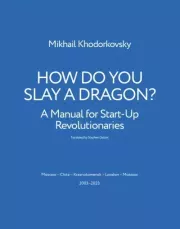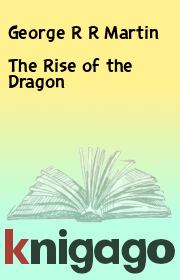Mikhail Khodorkovsky - HOW DO YOU SLAY A DRAGON?
 | Название: | HOW DO YOU SLAY A DRAGON? |
Автор: | Mikhail Khodorkovsky | |
Жанр: | Старинная литература | |
Изадано в серии: | неизвестно | |
Издательство: | неизвестно | |
Год издания: | 2022 | |
ISBN: | неизвестно | |
Отзывы: | Комментировать | |
Рейтинг: | ||
Поделись книгой с друзьями! Помощь сайту: донат на оплату сервера | ||
Краткое содержание книги "HOW DO YOU SLAY A DRAGON?"
Right at the start of this book, I had a great surprise. I know Mikhail Khodorkovsky’s story well. I reported for the BBC on his rise to prominence in the YUKOS oil company, his disputes with the newly-elected Russian President, Vladimir Putin, in the first years of the twenty-first century, and his arrest on trumped-up charges in October 2003 and subsequent imprisonment. Four days after his arrest I was due to have a meeting with him in Moscow. Instead, a meeting was arranged with a representative of the Russian Prosecutor’s Office to explain the arrest. The trial hadn’t yet begun. But the outcome was already evident.
Читаем онлайн "HOW DO YOU SLAY A DRAGON?". [Страница - 2]
- 1
- 2
- 3
- 4
- . . .
- последняя (55) »
But if, on the other hand, you really want to stand up for your rights and the rights of others, then that means getting involved in genuine politics. It means making choices, and it means standing up to be counted, with all the risks that this brings.
I occupy a unique place amongst the ranks of the opposition (true, this doesn’t exactly make me jump for joy). I have huge managerial experience, having worked in the government and at the head of a number of the country’s largest companies, companies that were of strategic significance to the country, and that were linked to dozens of towns and villages which were solely devoted to these industries. But despite all this, I am deprived of the opportunity to carry out practical organisational work on the ground.
When they kicked me out of the country, the authorities slammed the door shut behind me and turned the key, making it absolutely clear that in the event of my returning I would face the rest of my life in prison.
At the same time, I am one of the very few who has personal experience (we could say, “fortunately, very few”, although this experience came with a high price) who has actually told Vladimir Putin to his face exactly what I think about corruption at the highest levels of government. And just a month after doing this I faced criminal charges and ended up being locked up for more than ten years (six in a prison cell and four in a labour camp). Added to which I staged four hunger strikes, including two where I refused to take even liquids; and I carried out all of them – until my demands were met in the case of three of them – as a sign of solidarity.
Ten years. That’s almost as much as my friend, Platon Lebedev. It’s immeasurably less than my colleague, Alexei Pichugin, who’s still in jail. It’s easier than the fate that befell another of my colleagues , the lawyer Vasily Alexanyan, who only a year after his release died from a disease for which he was refused treatment while in prison…
I have something to put before these authorities; some things that will be remembered and some things that must never be forgotten.
But this is exactly why I don’t want to talk about the past; rather, I suggest that we look to the future.
I don’t believe I have the right to juxtapose justice and mercy; to forgive or to refuse to forgive those whom I consider should be punished.
I certainly don’t consider myself to be the bearer of the ultimate truth.
Each one of us has his or her own experience, our own scores to settle and our own thoughts on the future. But by virtue of the way in which my mind works I have decided not simply to consider that, well, “it wouldn’t be bad if we were to change those who are in power”. I’ve constructed a practical plan of action as to what to do “after Putin”.
From the way in which I think of time (and I look on time differently after the period I spent in prison) I believe that this regime does not have much time left: no more than five or ten years. How it’s going to end, I don’t know. Probably along with Putin. After all that has happened in Ukraine, I find it very difficult to imagine that he will step down of his own choice and live out however much time God grants him on some paradise island somewhere. He simply won’t be allowed to do that.
One way or another, this regime will meet its end. When it does, there will be so much that will have to be put right! And it has to be done quickly. It would be wonderful if, when this moment arrives, society has already decided who we are and where we’re heading; in which direction our road is leading in this rapidly changing world…
Introduction to the Study of Dragons.
My Path into Politics and What I Hope to Achieve
Politics was never important for me in and of itself. Before I found myself locked up, I was involved in politics only inasmuch as I needed it for business; in other words, simply to achieve those economic goals that were my priority at the time. Then came prison. Prison is hardly the optimum place to discuss politics; but it’s a good place to receive a political education. And this was what I earnestly strove to achieve when I wasn’t occupied with the other tasks that are put upon you when you’re in jail.
At the very end of 2013, Putin took the decision to release me. Even though, as they say, “hope dies last”, I considered the likelihood of such an outcome to my ten years of incarceration as highly unlikely. To this day I genuinely have no idea what guided Putin’s thinking. Probably there was a number of different reasons. There was the forthcoming Winter Olympics in Sochi, which he knew had to pass off in exemplary fashion. Then there was the personal request from the German Chancellor, Angela Merkel, that he hoped would lead to some sort of reciprocal cooperation. And, of course, there was the human emotion of compassion for my dying mother, for whom this would be the last chance to see me.
I was aware of all of these reasons and weighed them up while rapid preparations were being made for my expulsion from Russia. I understood, too, that without Putin’s goodwill and wish for this to happen, I would never be set free; and also, that his decision upset a lot of people in his circle. Therefore, even though I honestly warned the FSB officer who came to collect me that I did not intend to hide myself away from people and keep silent, I had absolutely no intention of becoming involved in politics simply to seek personal revenge. As far as I was concerned, my account was settled in my personal relationship with Putin: he had sent me down, thus depriving me and my family of ten years of my life; yet he had also saved my life. Looking back on matters now, it’s perfectly clear that had he not acted as he did then, I would have been confined to a life behind bars to the end of my days.
So when I said after my release that I didn’t intend to get involved in politics, I was completely sincere. I never had any desire to be involved in politics just to prove something to Putin, and that’s still the case. Paradoxically, our personal relationship worked out in such a way that I even owe him something. He could have killed me, but he didn’t. He could have left me to rot in jail, but he didn’t. I haven’t forgotten this. I planned to engage in targeted human rights’ and educational activities. It seemed to me that there was sufficient scope to employ my talents and my experience in these fields; and my money could also be very useful. But the more I became involved, the more intensely politics infiltrated into everything I touched. What had happened? What was it that convinced me to turn away from my initial firm resolve not to return to the world of politics?
In order to answer that question, I have to explain what I understand by “political activity”, and what my motivation is to engage in it. In the exact and only possible sense of the
--">- 1
- 2
- 3
- 4
- . . .
- последняя (55) »
Книги схожие с «HOW DO YOU SLAY A DRAGON?» по жанру, серии, автору или названию:
 |
| George R R Martin - The Rise of the Dragon Жанр: Старинная литература Год издания: 101 |
| Mikhail Khodorkovsky - How Do You Slay A Dragon Жанр: Старинная литература Год издания: 2022 |


